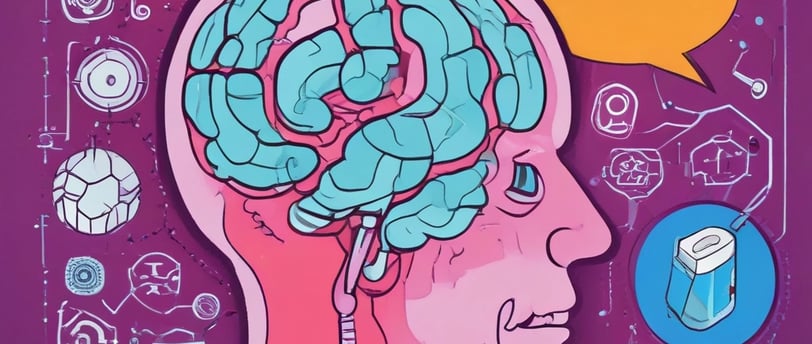Creatine and ADHD
Exploratory blog summarising possible positive benefits
HEALTH
4/20/20253 min read


ADHD and Brain Energy Demands:
ADHD is fundamentally linked to differences in brain function, particularly in areas responsible for executive functions: attention regulation, impulse control, working memory, and planning. These functions are primarily managed by the prefrontal cortex (PFC).
Executive functions are incredibly energy-intensive. Maintaining focus, inhibiting impulses, and manipulating information in working memory requires constant, efficient neuronal firing and communication.
Hypothesis: One dimension of ADHD challenges could relate to suboptimal energy regulation or meeting the high energy demands of these executive function circuits, leading to quicker mental fatigue, difficulty sustaining focus, or inconsistent performance.
Creatine's Role in Brain Energy:
Creatine is vital for the brain's energy buffering system (the phosphocreatine system), just as it is for muscles. It helps rapidly regenerate ATP, the primary cellular energy currency.
Supplementing with creatine increases the pool of creatine and phosphocreatine within the brain (though perhaps less dramatically than in muscle). This enhances the brain's capacity to quickly produce energy during periods of high demand.
Connection: If ADHD involves challenges in meeting the energy demands of the PFC and related networks, boosting the brain's energy reserve with creatine could potentially help these circuits function more efficiently and sustainably.
Potential Positive Possibilities for ADHD:
Enhanced Attention and Reduced Mental Fatigue: By providing more readily available energy (via faster ATP regeneration), creatine might help individuals with ADHD sustain attention for longer periods, particularly during demanding cognitive tasks (like schoolwork or complex projects). It could potentially reduce the feeling of "brain drain" or mental fatigue that often accompanies sustained focus attempts.
Improved Working Memory: Working memory involves holding and manipulating information actively, a very energy-demanding process highly relevant to ADHD difficulties. Increased energy availability via creatine could potentially bolster working memory capacity and efficiency, making it easier to follow multi-step instructions or mentally organize thoughts.
Support for Executive Function Under Stress: Creatine has shown benefits for cognitive functions, especially under stressful conditions (like sleep deprivation). Many individuals with ADHD also experience sleep difficulties, which can worsen symptoms. Creatine might help buffer the cognitive system against these stressors, leading to more consistent daytime functioning.
Boosting Neurotransmitter Synthesis/Release: While indirect, neurotransmitter systems (especially dopamine and norepinephrine, key in ADHD) rely on cellular energy for synthesis, packaging, release, and reuptake. Ensuring optimal energy availability could potentially support more efficient functioning of these neurotransmitter pathways critical for attention, motivation, and impulse control.
General Neuroprotection/Cellular Health: Creatine has demonstrated some neuroprotective properties in various models, potentially by stabilizing mitochondria and buffering against metabolic stress. Promoting overall brain cell health and resilience could be beneficial in the context of neurodevelopmental conditions like ADHD.
Supporting Observations (Biological Plausibility):
Creatine Deficiency Syndromes: Rare genetic disorders where the body cannot synthesize or transport creatine properly lead to severe neurological problems, including intellectual disability, developmental delays, autistic features, and movement disorders. This clearly demonstrates that adequate brain creatine is absolutely essential for normal neurodevelopment and function. This provides a strong "proof of principle" that optimizing creatine levels could influence cognitive function.
Early Research Signals: While large-scale clinical trials are lacking, some small pilot studies or case reports examining creatine in children with ADHD have suggested potential improvements in attention or cognitive scores, providing early, tentative signals that warrant further investigation.
Synthesizing the Positive Potential:
Creatine could potentially act as a cognitive energy enhancer relevant to ADHD. By boosting the brain's fundamental bioenergetic capacity, particularly in demanding frontal lobe circuits, it might help improve the consistency and endurance of executive functions. This could manifest as better-sustained attention, improved working memory, and reduced mental fatigue during cognitively demanding tasks. Rather than directly targeting neurotransmitters like typical ADHD medications, creatine's potential lies in supporting the underlying energy infrastructure that enables these cognitive processes to run more smoothly and efficiently. It represents a potential complementary approach focused on optimizing brain energy metabolism.